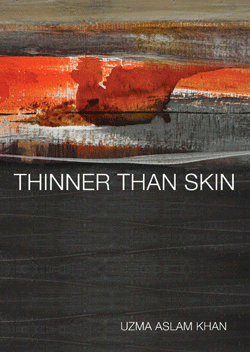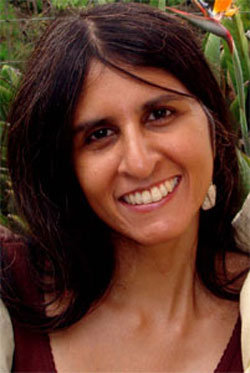Book Review: “Thinner Than Skin” — Ambitious to a Fault
Uzma Aslam Khan is a wonderful writer whose descriptions of the northern part of Pakistan and the fast fading way of life that had been lived there for hundreds of years are sometimes stunning.
Thinner Than Skin by Uzma Aslam Khan. Clockroot Books, 352 pages, $18, paperback.
By Roberta Silman
Uzma Aslam Khan is a well known, Pakistani writer, the author of three well-received, prize-winning novels, who lives in Western Massachusetts and teaches fiction writing at Hampshire College. My only contact with young, Pakistani authors was the superb collection of stories by Daniyal Mueenuddin, so I must confess my expectations were high when I received this book.
Khan is a wonderful writer whose descriptions of the northern part of Pakistan and the fast fading way of life that had been lived there for hundreds of years are sometimes stunning. Indeed the book is most alive when she is in the head of Maryam, the mother of a shepherding family whose lives are shattered by the arrival of guests in their midst who use her child as a pawn in their continuing lovers’ quarrel. The visitors serve as metaphors for the changes that have devastated that part of the world.
But for me, there is a problem with this ambitious book. Although it addresses important questions of identity, of women’s place in a society, of the relationships between friends and lovers and parents and children, the clash between present and past, and natives and interlopers, the characters at the center of the narrative, Nadir, a Pakistani photographer who lives in California, and Farhana, the girl he meets who is American but has a Pakistani father, are hard to root for. Farhana is self-centered and manipulative, intent only on her pilgrimage to the country to which she feels she must “return.” And Nadir seems utterly clueless.
Once the pilgrimage begins, in which Nadir and Farhana are accompanied by a friend of Farhana’s named Wes and Nadir’s brother, Irfan, the pages became clotted with far too many back stories. More importantly, there were times when I felt that this novel had too much of a political agenda (of course, there is a bomber lurking among them), to the point that the story cannot take imaginative flight because of its heavy-handed message. There are memorable passages about the fascinating behavior of the glaciers (which Farhana studies) and the dreams of the past narrated by Maryam. But the tangents on and references to the legends of this mountainous country or to the differences between the life of the nomads and the “sedentary people” end up bogging the narrative down. We are left with gorgeous writing that sometimes seems to go nowhere.
Yet when Khan is good, she’s very very good. Here is Maryam arguing with her husband when their child has been invited to go out in a boat:
“Where do they come from? [she asked.] Is it a place where a child is pulled from her family for amusement?”
His voice curdled. “You were always fond of drama. Kiran will be fine.”
Kiran will be fine.
For the hour that Kiran was in the boat, what did her husband do? He sat with the men of their tribe, debating the trouble in the valley. Down where the homestead lay, things had changed. There were military convoys looking for a killer. There were spies. There were accomplices. But there were no eyes, not up here, not for a girl afraid. And there were no ears, not up here, not for the bangles that called. Only Maryam could hear them, while sitting by the open hearth on the shores of the lake, her baby Jumanah beating a tune on the kangri firepot—perhaps she heard them too—in a circle made of copper bowls. They were calling her, but all she could do was listen. Eventually, she could neither see the boat nor hear the bangles. All she could do was nothing. Perhaps in that hour heart had already begun to stop.
Part of my reaction to Thinner Than Skin may be blamed on my unfamiliarity with this culture and its legends, as well as its landscape, and I must confess that I would have loved a map and a glossary as reference tools. But lots of fiction is about people and places unfamiliar to us. If it is good enough, e.g. the works of Gabriel Garcia Marquez or the Russian novels we all devoured when young, the strangeness of what is being conveyed doesn’t matter.
So I wish that Khan had been content to tell her story more simply and had had the courage to cut what wasn’t absolutely essential. Because as the events pile up and new characters take the stage, we become aware that the stakes are growing even higher than the story of Farhana and Nadir and their terrible error. Here is Nadir, on the final hike north, reporting on the landscape as he climbs through it:
The rocks were scratched with inscriptions of horses, as on the graves in Kaghan, and with a nimbus of winged figures—fairies, perhaps, or, according to Nur Shah [their guide], shamans. His fingerprints mixing with those who came before him, he also decoded battle scene left by warriors from the steppe, incense bowls scratched by Buddhist monks, and, a few feet away, an ancient script. Thousands of codes were said to remain hidden in the rocks, perhaps meant for those who’d yet to cross the mountains or ford the Indus, in which the people of Chilas had at one time ridden dinghies, panning for gold. . . .
“What happened here?” Wes said, turning back to the glyphs. . . .
Nur Shah’s face dropped as he shook his head. “You know the times. People think that if you draw a new line across an old one, you can remake the past.”
Oddly, in a book so dense with detail and so leisurely at times in its telling, the ending seems rushed, and the final climax occurs too far from center stage. But as I closed Thinner Than Skin, I also felt a strong need to read more by this talented, young writer whose vision is so fierce and large and complex.
Roberta Silman is the author of Blood Relations, a story collection; three novels, Boundaries, The Dream Dredger, and Beginning the World Again; and a children’s book, Somebody Else’s Child. She writes regularly for The Arts Fuse and can be reached at rsilman@verizon.net.


